STATEHOUSE REPORT | ISSUE 22.01 | JAN. 6, 2023
NEWS: S.C. Supreme Court rules 6-week abortion ban violates state constitution
NEWS BRIEFS: Minimum wage rises in 23 states, but not S.C.
LOWCOUNTRY, Ariail: No returns
COMMENTARY, Brack: Fallout on abortion ban ruling will create longtime political headaches
SPOTLIGHT: The Felkel Group
ANOTHER VIEW: Plastic is choking our ocean
FEEDBACK: Send us your thoughts
MYSTERY PHOTO: Old bridge
HAPPY BIRTHDAY TO US: With this issue, we begin our 22nd year of publication. Thanks for your readership and support through the years.
S.C. Supreme Court rules 6-week abortion ban violates state constitution
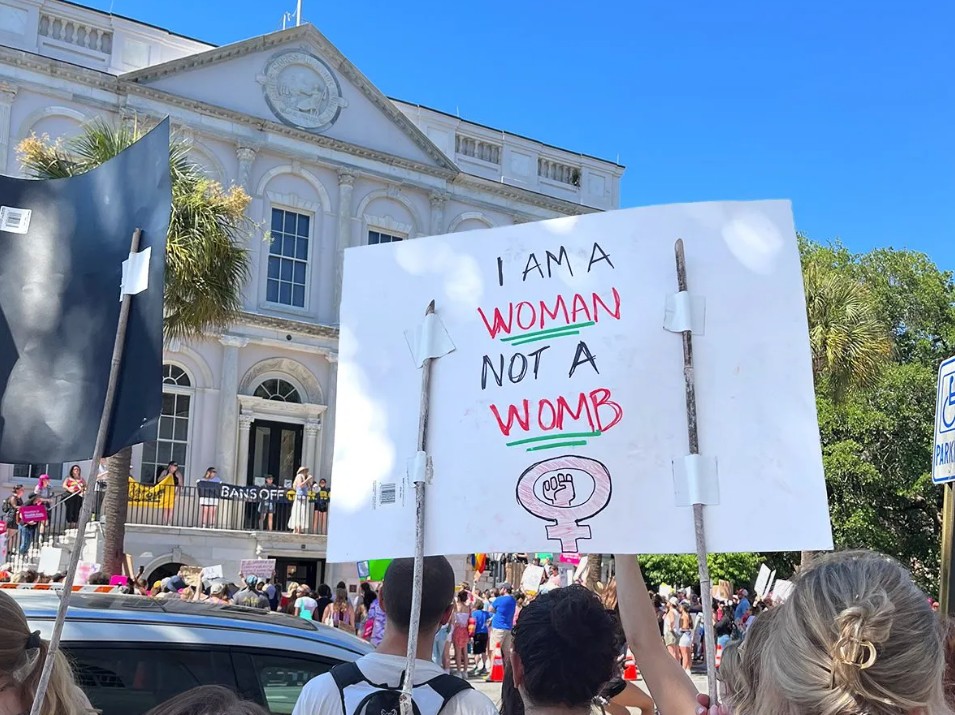
By Samantha Connors | The South Carolina Supreme Court Thursday permanently blocked the state’s six-week abortion ban in a 3-2 vote. The court ruled that the law, sometimes referred to as Senate Bill 1 or the fetal heartbeat ban, violates the right to privacy under the South Carolina Constitution.
“We hold that the decision to terminate a pregnancy rests upon the utmost personal and private considerations imaginable, and implicates a woman’s right to privacy,” Justice Kaye Hearn wrote in the lead opinion. “While this right is not absolute, and must be balanced against the state’s interest in protecting unborn life, this act, which severely limits—and in many instances completely forecloses—abortion, is an unreasonable restriction upon a woman’s right to privacy and is therefore unconstitutional.”
The fetal heartbeat act that was passed in 2021 prohibits women from seeking abortion care after any cardiac activity is detected. This typically occurs around six weeks of pregnancy when many women do not yet know they are pregnant.

In a concurring opinion, Chief Justice Donald Beatty recognized the passions involved in the abortion debate.
“Most commonly, people divide themselves into ‘pro-life’ and ‘pro-choice’ camps,” he wrote. “The decision today is not so limited. Our decision today is neither ‘pro-choice’ nor ‘pro-life’; it merely recognizes that our state constitution grants every South Carolinian a right to privacy, equal protection and due process of laws. This fundamental, constitutional mandate transcends politics and opinion.”
In June 2022, the U.S. Supreme Court overturned the landmark Roe v. Wade abortion protection. In states across the country, including South Carolina, that triggered previously passed legislation to ban abortion. A few weeks after the fetal heartbeat ban went into effect in South Carolina, it was blocked temporarily as the state’s high court considered a lawsuit that it violated the state’s constitutional right to privacy — a right not explicitly enshrouded in the U.S. Constitution.
In Thursday’s South Carolina opinion, Hearn wrote, “The state unquestionably has the authority to limit the right of privacy that protects women from state interference with her decision, but any such limitation must be reasonable and it must be meaningful in that the time frames imposed must afford a woman sufficient time to determine she is pregnant and to take reasonable steps to terminate that pregnancy.
“Six weeks is, quite simply, not a reasonable period of time for these two things to occur, and therefore the act violates our state constitution’s prohibition against unreasonable invasions of privacy.”
Dissenting Justices John Kittredge and George James generally argued that the constitution’s framers didn’t intend for the right of privacy to be applied to abortion.
“There is no language in article I, section 10 of the South Carolina Constitution that supports an interpretation of a privacy right that would encompass a right to abortion,” Kittredge wrote.
State leaders react
Following the court’s ruling, state leaders took to Twitter to share reactions.
Gov. Henry McMaster, who has previously expressed support for a total abortion ban with no exceptions for rape, incest or life-threatening conditions, tweeted: “Our State Supreme Court has found a right in our Constitution which was never intended by the people of South Carolina. With this opinion, the Court has clearly exceeded its authority. The people have spoken through their elected representatives multiple times on this issue. I look forward to working with the General Assembly to correct this error.”
South Carolina Attorney General Alan Wilson, another proponent of strict abortion laws, said, “We respectfully, but strongly, disagree with the Court’s ruling. We’re working with the Governor’s office and legislature to review all our available options moving forward.”
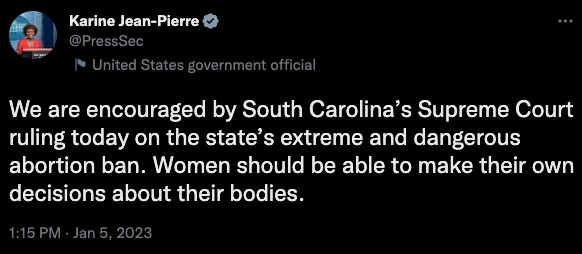 Not all legislators were upset by the ruling. Sen. Marlon Kimpson, D-Charleston and Dorchester Counties, tweeted, “Victory today for the women of South Carolina!”
Not all legislators were upset by the ruling. Sen. Marlon Kimpson, D-Charleston and Dorchester Counties, tweeted, “Victory today for the women of South Carolina!”
The White House also considered the decision a win. Press secretary Karine Jean-Pierre tweeted, “We are encouraged by South Carolina’s Supreme Court ruling today on the state’s extreme and dangerous abortion ban. Women should be able to make their own decisions about their bodies.”
But S.C. House Speaker Murrell Smith, R-Sumter, echoed conservative sentiments with this tweet: “The U.S. Supreme Court, through their [sic] Dobbs decision this summer, handed the issue of abortion back to state legislatures. Unfortunately, the South Carolina Supreme Court followed the path of the U.S. Supreme Court in Roe v. Wade by creating a constitutional right to an abortion where none exists. Today’s decision fails to respect the concept of separation of powers and strips the people of this state from having a say in a decision that was meant to reflect their voices. Instead, South Carolina is left with a decision that is not reflective of our state’s political process or will.”
Despite arguments that this decision does not reflect voters’ wishes, a November 2022 study from Winthrop University found that 46% of South Carolinians polled believe a woman should have access to abortion care for any reason and 86% supported abortion if in the case of life-threatening pregnancies.
Big win for women’s health advocates
The court’s ruling is a major milestone for the plaintiffs, which include Planned Parenthood South Atlantic and Greenville Women’s Clinic, according to women’s health care advocates.
“The court’s decision means that our patients can continue to come to us, their trusted health care providers, to access abortion and other essential health services in South Carolina,” said Jenny Black, president and CEO of Planned Parenthood South Atlantic.
“This is a monumental victory in the movement to protect legal abortion in the South. Planned Parenthood South Atlantic and our partners will continue our fight to block any bill that allows politicians to interfere in people’s private health care decisions,” she said.
With the fetal heartbeat now permanently blocked, women seeking abortions in South Carolina can receive reproductive health care up to 20 weeks. This would make South Carolina a major access point for abortion care in the Southeast as the procedure is illegal in nearby states including Tennessee, Alabama and Mississippi.
President and CEO of the New York City-based Center for Reproductive Rights Nancy Northup said, “The court justly rejected this insidious attempt to take away South Carolinians’ fundamental rights under the state’s constitution.
“These radical bans have wreaked havoc across the South and Midwest, but today’s decision means that the right to make deeply personal health care decisions will remain protected in South Carolina — an immense victory for South Carolinians and the entire region.”
South Carolina group Women’s Rights Empowerment Network’s CEO Ann Warner added, “Today’s decision from the state Supreme Court is a victory for everyone in South Carolina. The decision affirms that each of us should have the freedom and the privacy to make decisions about our future and our health.”
Planned Parenthood and other plaintiffs argued that the ban went against Article 1, Section 10 of the S.C. Constitution, which states:
“The right of the people to be secure in their persons, houses, papers, and effects against unreasonable searches and seizures and unreasonable invasions of privacy shall not be violated…”
The six-week ban was signed into law in February 2021, but blocked by federal courts later that year. The court then lifted the federal injunction and the law went into effect June 27, 2022, a few days after the U.S. Supreme Court overturned Roe v. Wade.
Planned Parenthood and other plaintiffs filed a lawsuit in state court to block the ban in July 2022, but the state court transferred the case to the S.C. Supreme Court, which issued a temporary ban in August.
After several unsuccessful attempts by the S.C. House and Senate to introduce stricter abortion laws in the 2022 legislative session, many women’s rights advocates expect state lawmakers to push more restrictions in the 2023 session.
“We know that lawmakers will double down on their relentless efforts to restrict essential health care, but we will continue to use every tool at our disposal to restore abortion access across the country once and for all,” Northup said.
Warner added, “Anti-abortion policymakers have already pre-filed dangerous abortion bans for the 2023 legislative session. We are ready to fight back against these attacks and protect access to imperative reproductive healthcare for all South Carolinians.”
Samantha Connors is managing editor of the Charleston City Paper, where an earlier version of this story first appeared. Have a comment? Send to: feedback@statehousereport.com
Minimum wage rises in 23 states, but not S.C.
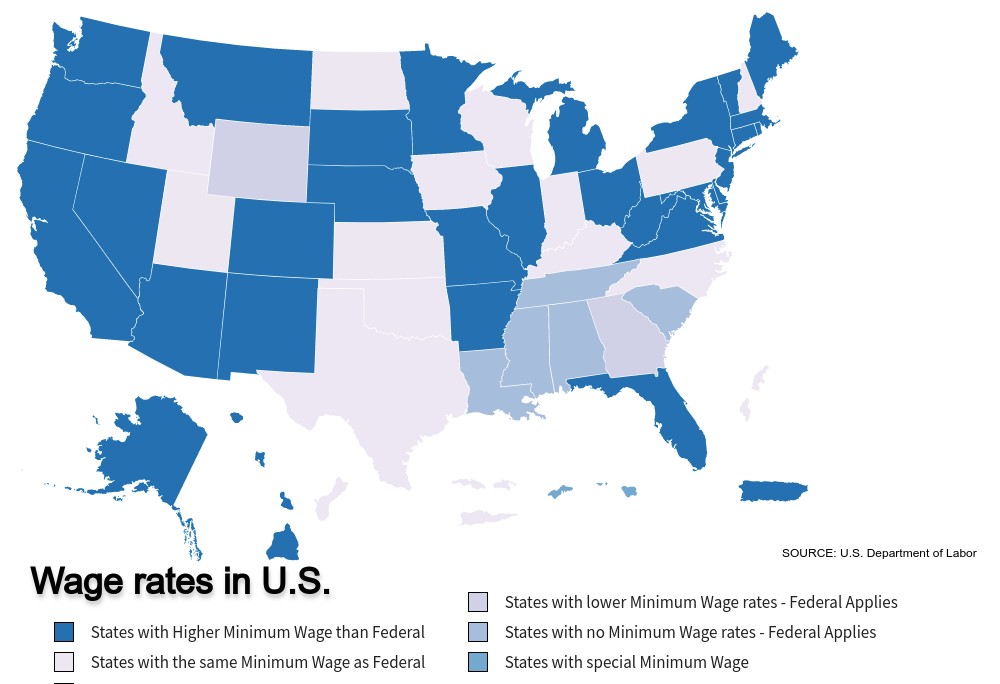
Staff reports | Twenty-three states raised their minimum wage at the beginning of the year – but not South Carolina, which is one of five states without a formal minimum wage.
In the Palmetto State, like Alabama, Louisiana, Mississippi and Tennessee, employers are subject to the federal Fair Labor Standards Act, which requires them to pay a $7.25 hourly minimum wage, according to the U.S. Department of Labor.

S.C. Rep. Wendell Gilliard, D-Charleston, says it’s high time that South Carolina adopt a minimum wage of $15 per hour.
“Two main reasons are the cost of living and inflation rate,” he said.
Minimum wage raises across the country varied, with Nebraska’s being the largest as the rate went from $9 to $10.50 on Jan. 1. The lowest increase was Michigan, which went up 23 cents to $10.10.
Only two Southern states have raised the minimum wage – Virginia by $1 to $12 per hour in January and Florida by $1 to $11 per hour last October.
Three Senate bills were prefiled last year in South Carolina to change the state’s minimum wage.
In other news this week:
![]() S.C. Supreme Court hear electrocution, firing squad case. South Carolina Supreme Court justices grilled attorneys for four death row inmates over whether the newly established firing squad or electric chair violates the state constitution. The Supreme Court also questioned attorneys for the state prison agency over why it’s been unable to obtain drugs for lethal injection, a universally preferred method of execution.
S.C. Supreme Court hear electrocution, firing squad case. South Carolina Supreme Court justices grilled attorneys for four death row inmates over whether the newly established firing squad or electric chair violates the state constitution. The Supreme Court also questioned attorneys for the state prison agency over why it’s been unable to obtain drugs for lethal injection, a universally preferred method of execution.
McMaster speaks out against St. Helena island changes. Gov. Henry McMaster penned in a letter his concern over amending the island’s cultural protection overlay. He said he fears the proposed development may cause an “open season” on the island for other developers. More than 5,000 people have signed petitions against development.
Weaver encourages task force to think big, bold about shortage. Incoming state Superintendent of Education Ellen Weaver says big, bold ideas are needed to address a teacher shortage.
Past Democratic primary state directors back S.C. for early primary. Fourteen former S.C. state directors for 2020 Democratic presidential primary candidates are backing the state’s move to hold the first presidential primary in 2024.
PANDEMIC: Over 10K cases recorded in S.C. The state Department of Health and Environmental Control reported a total of 10,481 for the week ending on Dec. 31.
No returns
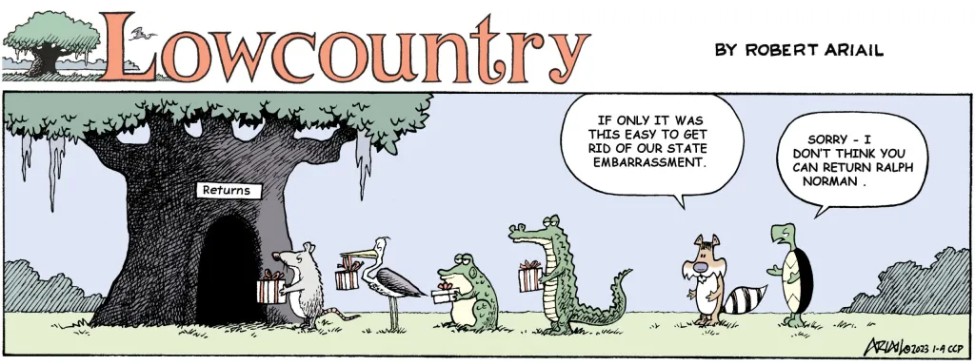
With U.S. Rep. Ralph Norman, R-S.C., voting 11 times (so far) this week against seating GOP leader Kevin McCarthy as House Speaker in a grinding House revolt, perhaps it’s appropriate for cartoonist Robert Ariail to turn his editorial pen to Washington. Ariail often interprets things a little differently, but always has an interesting take on what’s going on. Love the cartoon? Hate it? What do you think: feedback@statehousereport.com.
Fallout on abortion ban ruling will create longtime political headaches
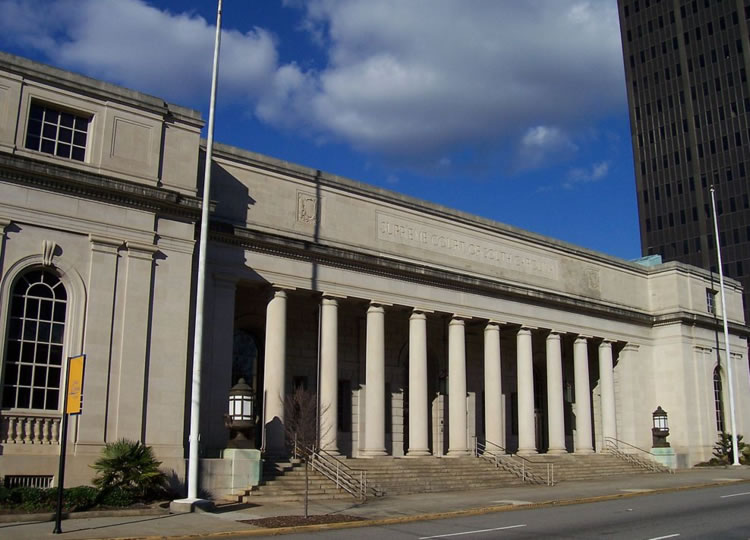
By Andy Brack, editor and publisher | At least three big things will happen after a major Thursday slap to the legislature by the state Supreme Court as it overturned a 2021-passed six-week abortion ban:
 FIRST: Outrage. The male-dominated, Republican abortion wingnuts are going to get crazier. Well, crazier than usual. First there will be a bunch of finger-pointing on “how could this have happened?” And then they’ll get down to work (they probably already are) to digest the ruling, pick it apart and figure out new ways for state government to get its clammy hands on what women choose to do with their bodies.
FIRST: Outrage. The male-dominated, Republican abortion wingnuts are going to get crazier. Well, crazier than usual. First there will be a bunch of finger-pointing on “how could this have happened?” And then they’ll get down to work (they probably already are) to digest the ruling, pick it apart and figure out new ways for state government to get its clammy hands on what women choose to do with their bodies.
SECOND: Logjam. The GOP, which tried to pass an even tougher abortion ban last year – as if a six-week ban wasn’t enough – will be on the warpath in the 2023 session to try to implode the “back to normal” hurdle on abortions after 20 weeks. Proposals for new abortion legislation will come fast and furious. They will suck the air out of the Statehouse and leave the legislature little room to accomplish anything else in the 2023 session. All thoughts of big progress on economic development, better schools, better health care, better infrastructure and more will mostly go out of the window, snared by the ongoing culture wars pushed by a minority (white men) on the rest of the state. Look for 2023 to be remembered as the year of “at least we passed a budget.”
THIRD: Flip the court. The author of the court’s 3-2 majority opinion, Justice Kaye Hearn, is expected to retire in February. That will set up a huge race to replace her. The likely outcome will be for the legislature, in a fit of “we’ll show you” pique, to elect a very right-wing Republican jurist to flip the court to create a safe conservative majority that could rule in favor of any future narrower abortion ban.
What’s kind of amazing, if you read through the long court opinion delivered Thursday, is that overturning the abortion ban from 2021 was a pretty conservative decision by the high court. Why? Because the majority interpreted the state constitution based on what it says – that there is an explicit right to privacy that protects people from government intrusion in their personal affairs. South Carolina’s constitution includes this explicit right written into its constitution, unlike the U.S. Constitution, which only implies it.
Article 1, Section 10 of the South Carolina Constitution is pretty clear on its face: “The right of the people to be secure in their persons, houses, papers and effects against unreasonable searches and seizures and unreasonable invasions of privacy shall not be violated.”
In the majority opinion, Hearn explained, “In interpreting this text, we must not only give the words their plain and ordinary meaning, but we must also give meaning to the entire text, and not render any provision meaningless.”
Furthermore, if you read the words of a concurring opinion by Chief Justice Donald Beatty, you can see how he went out of his way to explain that overturning the ban was a constitutional decision, not a political one:
“Most commonly, people divide themselves into ‘pro-life’ and ‘pro-choice’ camps. The decision today is not so limited. Our decision today is neither ‘pro-choice’ nor ‘pro-life’; it merely recognizes that our state constitution grants every South Carolinian a right to privacy, equal protection, and due process of laws. This fundamental, constitutional mandate transcends politics and opinion.”
A conservative woman with libertarian leanings in her 60s who we know reacted immediately when told of the court’s decision on the abortion ban: “I don’t want any insurance company or any government telling me what I can do with my body. Hands off.”
That’s what the majority of people in South Carolina believe in poll after poll. Republicans in the legislature ought to tune in to what most people believe, not just the nutjobs on the far right.
Read the opinion and its conclusion: “The State unquestionably has the authority to limit the right of privacy that protects women from state interference with her decision, but any such limitation must be reasonable and it must be meaningful in that the time frames imposed must afford a woman sufficient time to determine she is pregnant and to take reasonable steps to terminate that pregnancy. Six weeks is, quite simply, not a reasonable period of time for these two things to occur, and therefore the Act violates our state Constitution’s prohibition against unreasonable invasions of privacy.”
Andy Brack is editor and publisher of Statehouse Report and the Charleston City Paper. Have a comment? Send to: feedback@statehousereport.com.
The Felkel Group
 The public spiritedness of our underwriters allows us to bring Statehouse Report to you at no cost. This week in the underwriter spotlight is The Felkel Group, a battle-tested public affairs and business development firm that assists corporations, associations and not-for-profits that are serious about their long-term success. The Felkel Group solves problems, crafts and delivers messages, helps organizations to manage crisis, and uses a wealth and breadth of valuable relationships to help to seal deals.
The public spiritedness of our underwriters allows us to bring Statehouse Report to you at no cost. This week in the underwriter spotlight is The Felkel Group, a battle-tested public affairs and business development firm that assists corporations, associations and not-for-profits that are serious about their long-term success. The Felkel Group solves problems, crafts and delivers messages, helps organizations to manage crisis, and uses a wealth and breadth of valuable relationships to help to seal deals.
The Felkel Group is also home to an outstanding advocacy tool called The Rap Index, a powerful intelligence tool that employs sophisticated computer modeling and profiling techniques to help organizations find their most effective advocates. To learn more about The Felkel Group and its Rap Index, go to: http://www.felkelgroup.com.
Plastic is choking our ocean
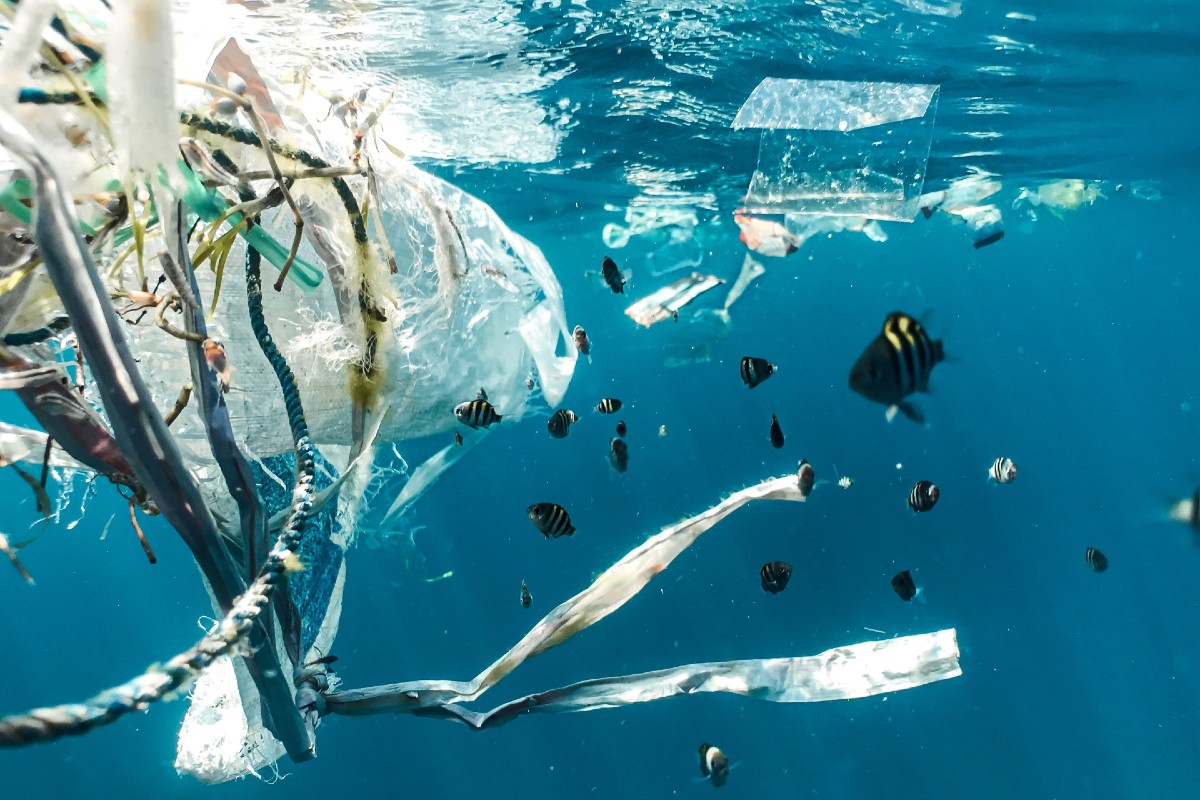
Editorial from the Charleston City Paper | When you gaze at the ocean from any of South Carolina’s beaches, you witness an undulating calm that seeps into your body and relaxes. But as a fall report by the Pew Charitable Trusts offers, that calm is deceiving. Under the seas is a chaotic blender of human-induced plastic and waste that’s wreaking havoc on the ocean that feeds millions and provides half of our oxygen.
“The ocean is in trouble,” Pew President and CEO Susan K. Urahn writes in the fall issue of Trend, “stressed by overfishing, pollution and a warming climate that is altering its very chemistry.” But she adds meaningful solutions are available now that can mitigate damage: “Marine protected areas show that the ocean can replenish itself. Science-based fisheries management proves that depleted stocks can be restored. As altered as the ocean has been by climate change, coastal wetlands remain the planet’s best carbon dioxide storehouses.”
Perhaps the most alarming part of the Trend issue is how plastic is choking our ocean. “Some 11 million metric tons of plastic enter the ocean every year, the equivalent of a garbage truck full of plastic every minute,” Pew staffer Winnie Lau writes.
Part of it is what we see on our beaches — plastic caps, straws, bags, bottles. But there are also microplastics from the breakdown of vehicle tires, textiles and other ocean litter. Then there’s pesky plastic micropellets, or nurdles, which Charleston Waterkeeper finds every time it sifts through sand on our beaches. What’s particularly dangerous about these pellets is that they mimic fish eggs and other organisms, which means they’re eaten by sea life and get into our food supply. And while there’s state legislation to thwart nurdle spills, more needs to be done to curb use of plastic altogether.
Not only does it mean local governments need to work with local manufacturers and businesses to encourage reduction in the use of plastic, but it means national governments need to cooperate to get big companies to change packaging practices to make them more sustainable and green.
The 3Rs of conservation — reduce, reuse and recycle — can make a big difference for our oceans. Only 9% of plastic makes it to recycling plants, Pew reports, obviously suggesting that more vigorous recycling programs at local levels could easily cut the plastic trash filling the ocean. What’s recycled can be reused. And if packagers start using more sustainable materials — like the computer industry has done with an abundance of cardboard replacing plastic — then we’ll cut what’s wasted and sinks below the ocean’s surface.
There are myriad strategies that can keep waste streams out of the ocean and help it to recover. But here in our backyard, let’s do everything we can to curb use of plastic waste so it doesn’t end up in places we want to remain as clean as possible.
Send us your thoughts about what’s happening in S.C.
Have a comment? Send your letters or comments to: feedback@statehousereport.com. Make sure to provide your contact details (name, hometown and phone number for verification. Letters are limited to 150 words.
Old bridge

Here’s an old picture of an old South Carolina bridge. We’re not sure if it’s even around anymore. But where was it? Send us your guess – as well as your name and hometown – to feedback@statehousereport.com.
 Last week’s phot0, “Locked up,” was tough. Still, some super-duper sleuths figured it out. Jay Altman of Columbia was first to share, “It’s a love lock on the Love Lock fence on the Johnny Jeffcoat Walkway, Lake Murray Dam, Lexington, S.C.” Others who correctly identified the photo, sent to us by Columbia resident Elizabeth Jones, were Allan Peel of San Antonio, Texas; Will Williams of Aiken; Pat Keadle of Wagener; and George Graf of Palmyra, Va.
Last week’s phot0, “Locked up,” was tough. Still, some super-duper sleuths figured it out. Jay Altman of Columbia was first to share, “It’s a love lock on the Love Lock fence on the Johnny Jeffcoat Walkway, Lake Murray Dam, Lexington, S.C.” Others who correctly identified the photo, sent to us by Columbia resident Elizabeth Jones, were Allan Peel of San Antonio, Texas; Will Williams of Aiken; Pat Keadle of Wagener; and George Graf of Palmyra, Va.
- ORDER NOW: Copies are in Lowcountry-area bookstores now, but if you can’t swing by, you can order a copy online today.
- Now available as an e-book!
ABOUT STATEHOUSE REPORT
Statehouse Report, founded in 2001 as a weekly legislative forecast that informs readers about what is going to happen in South Carolina politics and policy, is provided to you at no charge every Friday.
- Editor and publisher: Andy Brack, 843.670.3996
Donate today
We’re proud to offer Statehouse Report for free. For more than a dozen years, we’ve been the go-to place for insightful independent policy and political news and views in the Palmetto State. And we love it as much as you do.
But now, we can use your help. If you’ve been thinking of contributing to Statehouse Report over the years, now would be a great time to contribute as we deal with the crisis. In advance, thank you.
Buy the book
Now you can get a copy of editor and publisher Andy Brack’s We Can Do Better, South Carolina! ($14.99) as a paperback or as a Kindle book ($7.99). . The book of essays offers incisive commentaries by editor and publisher Andy Brack on the American South, the common good, vexing problems for the Palmetto State and interesting South Carolina leaders.
More
- Mailing address: Send inquiries by mail to: P.O. Box 21942, Charleston, SC 29413
- Subscriptions are free: Click to subscribe.
- We hope you’ll keep receiving the great news and information from Statehouse Report, but if you need to unsubscribe, go to the bottom of the weekly email issue and follow the instructions.
- Read our sister publication: Charleston City Paper (every Wednesday in print; Every day online)
- © 2023, Statehouse Report, a publication of City Paper Publishing, LLC. All rights reserved.
















 We Can Do Better, South Carolina!
We Can Do Better, South Carolina!